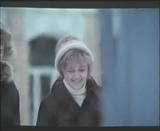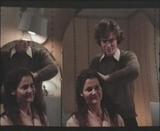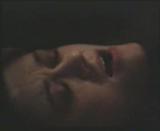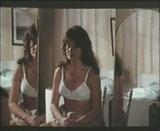
Mors Hurs (Full Movie)
Mors Hus (Mother’s House), Norway 1974.

This is the surreal drawing reflecting Jonathan’s picture of his destiny. It is explained below.
Petter (Svein Sturla Hungnes) quits his studies, and break up with his girlfriend. He moves back to his homeplace, and to his mother (Bente Børsum) who lives alone. There has always been a good relationship between Petter and his mother, and she doesn`t mind that he moves back home. When Petter finds a new girl at his homeplace, his mother reacts in a negative way.
Notes by Roddie.
IF YOU READ THESE NOTES AND WATCH THE SCREENPLAY CAREFULLY YOU WILL UNDERSTAND EVERYTHING WITHOUT NEEDING SUBTITLES.
This is not a film wherein you have to understand every word, such as The Maltese Falcon or Time Bandits or Excalibur. WATCH THE SCREENPLAY.
Synopsis and commentary.
The reason his mother reacts unfavourably to the new girlfriend is that she is in love with her son. He is in love with her. That is the significance of the drawing he made before walking out of the exam hall, the same drawing as on the box of the videocassette. This is the significance of the obsessive but serene (Plutonian) theme music. (A well-known piece by Pachelbel). Near the end of the film the balance between his ties to his girlfriend and his fated bond with his mother is tipped. He abruptly leaves his girlfriend and runs back to his mother’ s house. Notice the use of the style of German expressionism of the 1930’ s and 1940’s in this scene as he runs down the empty road in the bright moonlight between the trees. At the end of the movie the mother and son have sex together. The last scene is an outside view of the house, with the theme music by Pachelbel playing.
The film follows a novel by the well-known Norwegian writer Knut Faldbakken, called Sin Mors Hus (His Mother’ s House). Whereas everything else by this writer has been translated into very many languages, this book has only been translated into Dutch, as Zijn Moeders Huis. (The Danes and Swedes would have had to stop pretending they couldn’t read Norwegian).
I (Roddie) don’t see the story as the writer of the blurb quoted below does. I suppose the writer of the blurb was struck by the fact that the mother is never given a name. (IMDb thinks the mother’s name is Moren, but that is due to clumsy copying from a list in Norwegian. Moren means “the mother” in Norwegian). From this, it has been assumed that Jonathan is drawn to her because she is his mother. I on the other hand see the absence of a name in the light of the surreal drawing done by Jonathan in the exam hall and shown on the videocassette box. She is the woman destined for him, whom he has always seen subconsciously, but whom he can suddenly one day represent as a surreal drawing. It is OTHER women that have a name because they are not her. I see the two characters, Jonathan and his mother, as fated lovers. The compulsively sexual relationship with Eva is a mechanism both conscious and unconscious for building a wall to hide this knowledge. Such walls need constant energising, and eventually collapse or dissolve. The shock can be traumatic, but can heal, as here. Why, then, the device of making them mother and son? Why not just make them a man and a woman? Because they have FORCED FATE to be together, and the only way of doing this was for one of them, perhaps both of them, to be born out of time.
Roddie’s translation from the blurb of the Dutch translation of the novel.
After a “visionary” insight, Jonathan a twenty-five year old student, sunders his ties to the environment he lives in. He gives up his studies, breaks off his engagement to a nice girl and goes back to his mother. Going back is what he does in the most literal meaning. On the way home he meets Eva, a pretty young woman with whom he starts up a relationship in which sexuality plays an overly dominant role. Jonathan’s mother, however, sees the young woman as a rival and the two women compete for Jonathan’s attention. This brings an element of ambiguity to the relationship between Jonathan and his mother, a relationship inexorably sliding towards being a romantic one. When at last Jonathan breaks off his relationship with Eva, he flies literally back to his mother’s embrace. This is a sensitive theme handled in a unique way by Knut Faldbakken, worked out without any sensationalism.










A single mom letting son sleep in same bed with her, of course something is bound to happen. Norwegian language, too bad no english subtitles.
这部电影在当时是可以在北欧地区公开发售的,虽然全片1个多小时并没有太多的裸露镜头,但情节真实,在当时有很大争议。
并且这部电影的题材不是象2007年Normal(国内译走出阴影)那样打stepmother的擦边球,是真实类题材。
生动情节和全程的大提琴音乐正是这片出采的地方,在北欧的一些论坛这部片子还是被评价为Incest类NO.1
目前有2个版本,一个是挪威语一个法语,可惜没英语版本。不过听suninmind的几个高级ID朋友说心中的阳光准备翻译这部片子。
[
本帖最后由 huhaoda 于 2010-8-24 10:03 编辑 ]
![SiS001! Board - [第一会所 关闭注册]](images/green001/logo.png)

